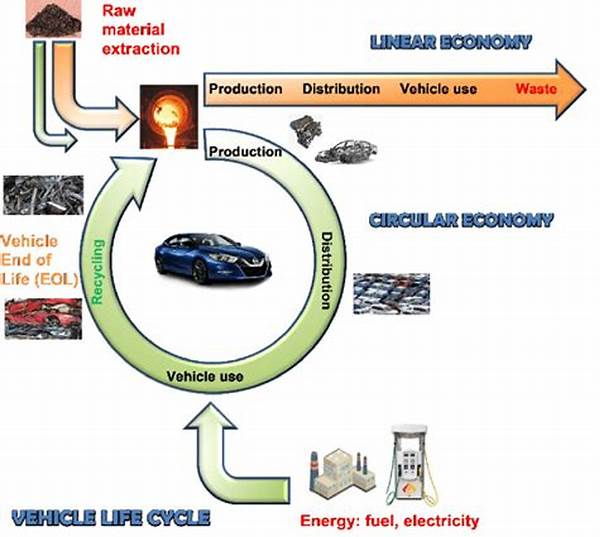
Holistic Approach To Vehicle Lifecycle
In an ever-evolving automotive industry, the holistic approach to vehicle lifecycle isn’t just a trend; it’s a necessity. This comprehensive strategy addresses the environmental, economic, and social impacts of vehicles from inception to disposal. By adopting this perspective, manufacturers and consumers alike can contribute to a sustainable future. It’s vital to understand that every phase of a vehicle’s life offers an opportunity to minimize its footprint. Embracing a holistic approach to vehicle lifecycle ultimately leads to more efficient use of resources and minimizes waste, forging a path towards a greener planet.
Read Now : Fleet Management Telematics Solutions
Understanding the Holistic Approach to Vehicle Lifecycle
Implementing a holistic approach to vehicle lifecycle requires a total paradigm shift. From the design phase, vehicles should be crafted with sustainability in mind, employing recycled materials and energy-efficient technologies. During production, manufacturers need to prioritize eco-friendly processes that minimize emissions. This holistic approach to vehicle lifecycle ensures that vehicles are optimized for longevity and efficiency. Consumers play a crucial role too, as informed choices lead to reduced environmental impact. Finally, end-of-life strategies, such as recycling and repurposing, are necessary for this full-circle approach, ensuring minimal waste and environmental impact.
Advantages of a Holistic Approach to Vehicle Lifecycle
1. Sustainability: A holistic approach to vehicle lifecycle encourages sustainable practices, from design to disposal, reducing the overall carbon footprint.
2. Efficiency: It maximizes resource use, ensuring that every element of the vehicle is utilized optimally throughout its life.
3. Cost-Effectiveness: By focusing on long-term planning and efficiency, this approach can result in significant cost savings over time.
4. Innovative Solutions: Embracing holistic principles fosters innovation in materials and processes.
5. Environmental Responsibility: It emphasizes reducing pollution and waste, safeguarding natural ecosystems.
The Future of Automotive with Holistic Lifecycle Management
The holistic approach to vehicle lifecycle is not merely an option; it’s the foundation of the future automotive industry. This forward-thinking strategy underscores the importance of designing vehicles with end-of-life in mind. Manufacturers committed to this approach are positioning themselves as leaders in eco-consciousness. By utilizing renewable energy sources, developing biodegradable components, and implementing advanced recycling techniques, the industry can substantially reduce its environmental impact. Consumers are also pivotal in this change, as demand for sustainable vehicles encourages automakers to adopt these principles. Transitioning to a holistic approach to vehicle lifecycle presents multiple benefits for manufacturers, governments, and society at large.
Read Now : Heavy-duty Tools For Vehicle Repair
Strategies for Implementing a Holistic Vehicle Lifecycle Approach
Implementing a holistic approach to vehicle lifecycle involves strategic planning and collaboration across sectors. This initiative starts with robust research and development to discover innovative materials that offer durability with minimal environmental impact. Automakers must work with regulatory bodies to ensure compliance with eco-friendly standards. The integration of advanced technology such as AI and IoT can further streamline and enhance lifecycle processes. Engaging stakeholders, including consumers, leverages collective action towards sustainability. This multifaceted approach not only enhances a brand’s reputation but also contributes to a more sustainable automotive ecosystem.
Key Components of a Holistic Vehicle Lifecycle
Designing with a Purpose
Designing vehicles with a holistic approach to vehicle lifecycle begins with selecting materials that can be recycled and reused efficiently. By embedding these principles into the engineering process, automakers can drastically reduce environmental impact while enhancing vehicle performance. Each stage of design and production should promote energy efficiency and waste minimization, setting the groundwork for a sustainable lifecycle. Forward-thinking design plays a crucial role in supporting the vehicle’s end-of-life management, ensuring components can be easily repurposed and recycled. As the automotive industry continues to evolve, a sustainability-focused design is not just beneficial—it’s imperative.
Boosting Consumer Awareness
For the holistic approach to vehicle lifecycle to be successful, consumer awareness is key. Educating the public on the environmental benefits and cost efficiency of choosing sustainable vehicles can drive demand and spur industry change. It involves highlighting how each purchase affects the environment and what can be done to mitigate this impact. Providing transparency around manufacturing processes and end-of-life solutions empowers consumers to make informed decisions. When buyers understand the long-term benefits of sustainable vehicles, they are more likely to prioritize eco-friendly options, ultimately influencing industry standards and accelerating environmental progress.
Summing Up the Holistic Vehicle Lifecycle
In conclusion, the holistic approach to vehicle lifecycle represents a crucial evolution in automotive manufacturing. It encompasses an eco-conscious mindset from initial concept through to the final stages of recycling and waste reduction. This comprehensive outlook fosters innovation in sustainable technologies and practices while addressing consumers’ increasing demand for environmentally responsible products. By integrating these principles, the automotive industry can significantly decrease its environmental impact and usher in a new era of green mobility. The efforts of manufacturers, consumers, and policymakers toward embracing this approach are pivotal in crafting a more sustainable future for all.